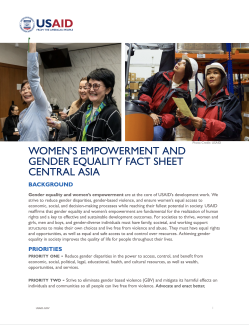BACKGROUND
Gender equality and women’s empowerment are at the core of USAID’s development work. We strive to reduce gender disparities, gender-based violence, and ensure women’s equal access to economic, social, and decision-making processes while reaching their fullest potential in society. USAID reaffirms that gender equality and women’s empowerment are fundamental for the realization of human rights and a key to effective and sustainable development outcomes. For societies to thrive, women and girls, men and boys, and gender-diverse individuals must have family, societal, and working support structures to make their own choices and live free from violence and abuse. They must have equal rights and opportunities, as well as equal and safe access to and control over resources. Achieving gender equality in society improves the quality of life for people throughout their lives.
PRIORITIES
priority one - Reduce gender disparities in the power to access, control, and benefit from economic, social, political, legal, educational, health, and cultural resources, as well as wealth, opportunities, and services.
priority two - Strive to eliminate gender based violence (GBV) and mitigate its harmful effects on individuals and communities so all people can live free from violence. Advocate and enact better, stronger, and accountable GBV laws throughout Central Asia. Also, increase the percentage of women who seek help when suffering from domestic violence.
priority three - Increase the capability of women and girls to fully exercise their rights, determine their life outcomes, assume leadership roles, and influence decision-making in households, communities, and societies. Strengthen civil society organizations (CSOs).
priority four - Advance structural changes that address the root causes of gender inequality and promote equitable gender norms by increasing awareness and acknowledgement of gender bias and GBV in Central Asia. Strengthen independent media and human rights advocacy activities.
KEY RESULTS
DEMOCRACY USAID’s governance activities reduce disparities between women and men by providing women accessibility and control over economic, social, political, educational, and cultural opportunities. Women are given the skills and affirmation to participate in decision-making at local, regional, and national levels of government. USAID’s media programs bring balanced, inclusive, and empowering information to Central Asia. USAID’s Safe Migration in Central Asia (SMICA) activity supports vulnerable female populations by addressing human trafficking while reducing cultural stigmas and increasing employment opportunities. A USAID-funded Social Innovation in Central Asia (SICA) program in 2022 resulted in the launch of a successful pilot project on anti-domestic violence in Kazakhstan that is now being used throughout Central Asia. This has proven to be the catalyst for passing and implementing long-awaited anti-domestic violence legislation.
ECONOMIC GROWTH USAID strengthens the capacity of women-owned businesses to access new markets and job skills training through USAID’s Trade Central Asia (TCA) and Future Growth Initiatives (FGI) activities. USAID’s Water and Vulnerable Environment Activity (WAVE) engages women to oversee the efficient use of water, maintain water infrastructure systems, and monitor water quality. USAID activities also focus on women in STEM (Science, Technology, Engineering, and Mathematics) programs improving women’s participation in the energy sector and addressing gender inequality.
HEALTH USAID supports national tuberculosis programs by integrating TB services into primary health care to combat multidrug-resistant TB. Central Asia, which has some of the highest TB burdens in the world, also engages CSOs and communities to improve patient-centered TB care and prevention. USAID’s Meeting Targets and Maintaining Epidemic Control EpiC project has reduced the stigma associated with infection with HIV, lowered rates of HIV cases, and empowered women to make healthy lifestyle choices.
CONTACT: Rabiga Baytokova, Strategy and Program Office, USAID/Central Asia, rbaytokova@usaid.gov


